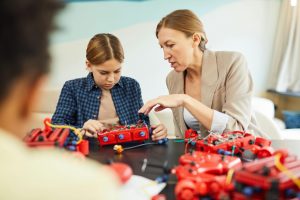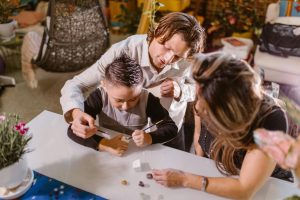Social-Emotional Learning: Building Strong Foundations
Social-emotional learning (SEL) has become a buzzword in education over the past few years, and for good reason. As educators and parents, it’s important to recognize that academic success is not the only key to a happy and successful life. Social and emotional development, or the ability to understand and manage one’s emotions, establish positive relationships, and make responsible decisions, plays a crucial role in a child’s well-being and overall development.
The Importance of SEL
Social-emotional learning helps children develop a strong sense of self-awareness, self-management, social awareness, relationship skills, and responsible decision-making. These skills are not only essential for academic success, but they also play a vital role in a child’s social and emotional well-being. According to a study by the Collaborative for Academic, Social, and Emotional Learning (CASEL), students who participated in SEL programs showed improved academic performance, increased positive social behaviors, and decreased conduct problems and emotional distress.
Impact on Learning
Emotions play a significant role in how students learn and process information. When students feel anxious, stressed, or upset, it can hinder their ability to focus, retain information, and problem-solve. SEL teaches students strategies to manage their emotions and cope with stress, allowing them to be more focused and engaged in their learning. Additionally, SEL helps students build resilience and develop a growth mindset, which is essential for academic success.
Building Strong Foundations
SEL provides a foundation for students to develop important life skills that will benefit them in all aspects of their lives. By teaching students how to communicate effectively, establish positive relationships, and make responsible decisions, SEL prepares them for success not only in school, but also in their personal and professional lives. These skills will continue to be relevant as they transition into adulthood and face challenges in the real world.
Implementing SEL
While social-emotional learning may seem like common sense, it’s not always easy to implement in a classroom setting. However, there are several ways educators and parents can incorporate SEL into daily routines:
Classroom Activities
Incorporating SEL into classroom activities is a great way to teach and reinforce social and emotional skills. These activities can include team-building exercises, role-playing, and sharing circles.
Modeling Behavior
Children learn a lot by observing and imitating the behavior of adults. Modeling positive social and emotional skills, such as empathy, communication, and conflict resolution, can have a significant impact on students and their development.
Creating a Positive and Supportive Environment
A positive and supportive environment is essential for teaching and practicing SEL skills. By fostering a safe space where students feel comfortable expressing their emotions and opinions, educators can help students build strong social and emotional foundations.
The Future of SEL
With the rise of technology and social media, young people are facing new challenges and pressures that can affect their social and emotional well-being. Incorporating SEL into education is more crucial now than ever before. As educators and parents, it’s our responsibility to provide children with the tools they need to navigate the complexities of the modern world and develop into happy, healthy, and emotionally intelligent individuals.
The Bottom Line
Social-emotional learning is not just a trend; it’s a crucial component of a child’s overall development. By teaching children how to understand and manage their emotions, establish positive relationships, and make responsible decisions, we are equipping them with the skills they need to thrive in all aspects of their lives. SEL is more than just a curriculum; it’s a way of life that promotes empathy, understanding, and a positive sense of self. By building strong foundations of social and emotional skills, we are setting the stage for children to reach their full potential and lead happy and successful lives.










